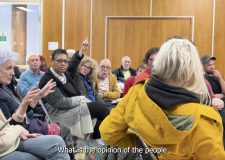The Vote: Cycling chief advises MPs
Cycling chief advises MPs
Brighton and Hove’s cycling supremo Ian Davey was asked to talk about safety by a House of Commons select committee. Frank le Duc reports.

A Green councillor was invited to give evidence to MPs last week about cycling safety. Brighton and Hove City Council deputy leader Ian Davey, who leads on transport, told them that there were areas where a strong lead needed to be given by
the government. In particular he called for clear ring-fenced funding for sustainable transport measures, focused on walking and cycling.
The government at a national level should run a public safety campaign he said. Responding to a question about “mutual respect” among different road users – drivers, pedestrians and cyclists – he evoked the spirit of the 1970s. Advertising and campaign slogans four decades ago included “this is the age of the train” and “clunk-click every trip” – the latter from when seatbelts became compulsory for drivers. A road safety campaign from the same era included the advice to “stop,look, listen” – often followed by a line like “when you cross the road use the Green Cross Code”.
“I remember some of the public safety adverts that were on TV when I was a child”
He said: “I would love to see a promotional campaign, run nationally, about mutual respect. I remember some of the public safety adverts that used to be on TV when I was a child and they have stuck with me until now. The benefit of those types of public safety advertising should not be underestimated and I would like to see some of that led from central government.”
Some matters were best dealt with by councils though, he said. Those matters included enforcement. It should be handed to councils, he said, because the police lacked the resources. “We work very well with the local police,” he said, “but they have their pressures so it is about targeting the response.
“We would always argue that it is not about enforcement. It is about compliance and encouraging compliance. One of the problems in encouraging compliance is when people know that a transgression will not be enforced. That is why it is so important that those powers for moving traffic offences come to local authorities, who are in the best position to be able to enforce them.”
Brighton and Hove has given a lead which the government could encourage, Councillor Davey suggested. He was answering a question about whether councils co-operated when cycle lanes crossed from one area to another and whether cycle lanes had a standard width. He said: “This is where national standards would come in.
“In our cycle lanes, anything that we have put in over the last few years is a minimum of two metres, because we consider that to be the minimum acceptable.
Anything less than that is a compromise … I think there are accepted standards but having it laid down in a national standard for infrastructure would be invaluable.
“We are starting to work more closely with our neighbouring authorities but there is a long way to go. Locally we have created the idea of a Greater Brighton and our ‘cycle city ambition’ bid was based on the Greater Brighton area. Unfortunately, that was unsuccessful but for the first time it had cross-boundary infrastructure.
That is part of our 10-year vision for cycling in the area because we know that movements do not end at the city boundary.”
Within the city limits, he spoke about the revamp of the Seven Dials and the introduction of 20mph speed limits as well as the danger presented by lorries. When the House of Commons Transport Select Committee reports later this year, it will be interesting to see whether the cross-party group of MPs accepts Councillor Davey’s ideas.




















